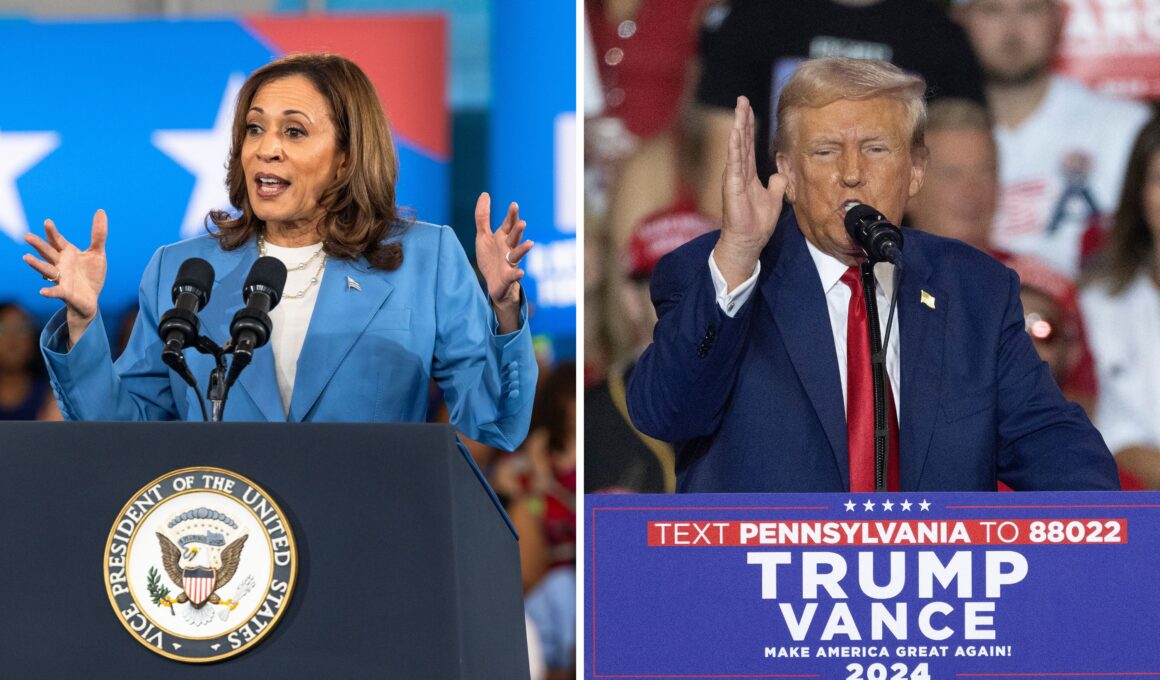As the 2024 election draws closer, an election forecast published on Friday is predicting the Electoral College vote totals for Vice President Kamala Harris, the presumptive Democratic presidential candidate and Donald Trump, the GOP presidential nominee.
According to The Economist‘s national forecast model published on Friday, Harris and Trump have about a 1 in 2 chance of winning the Electoral College, which awards each state a certain number of electoral votes based on population. A presidential candidate needs to secure 270 electoral votes for victory, and winning the national popular vote does not guarantee the White House.
The election forecast shows that the median likely range of total electoral votes for Harris is at 272 while Trump is at 266.
This is a change from the 2020 election which saw Trump with 232 electoral votes and the Democratic nominee Joe Biden with 306, according to the forecast.
According to The Economist, the model estimates each major candidate’s chances of winning each state and the overall Electoral College. Developed by Columbia University, the forecast combines national and state-level polls with fundamental data about the state of the economy, historical voting patterns and the demographics of each state to predict the likelihood of various outcomes of the race by constructing thousands of scenarios.
“To work out the probable electoral-vote totals, we run over 10,000 simulations of the election. The chance of a tie in the electoral college is less than 1 in 100,” The Economist said.
Newsweek has reached out to Harris’ and Trump’s campaign via email for comment.
The forecast also shows Arizona, Georgia, North Carolina, Pennsylvania, Wisconsin, Nevada, and Michigan as key states to look out for when it comes to Electoral College votes since those battleground states, worth 77 electoral votes, will play a key role in determining the result of this year’s election.
Most notably, the forecast model shows Pennsylvania having the highest chance at 24 percent of being the state that decides the election with 19 electoral votes.
An Emerson College and RealClearPennsylvania poll that was published on Friday showed that out of 1,000 likely Pennsylvanian voters surveyed on August 13 and 14, 49 percent backed Trump, with 48 percent backing Harris. The poll has a margin of error of 3 percent, meaning the candidates are in a statistical tie.
This comes as the Democratic presidential ticket has seen a dramatic reversal in the polls since Biden made the unprecedented decision to drop out of the race on July 21 and endorse his vice president. Harris has surged in the polls—leading Trump in national and swing state polling averages whereas Biden was generally behind.
The shift can be also seen as an analysis from Decision Desk HQ in February, based on polling across the country, predicted that Trump will win a total of 312 Electoral votes in November, the biggest number a GOP candidate has received since George H.W. Bush‘s 1988 victory when he received 426 votes.
According to Decision Desk HQ’s predictions at that time, Trump was on course to win a number of swing states that Biden flipped in 2020, including Arizona and Nevada.
In addition, Trump was also said to be on course to win the so-called “Blue Wall” states of Michigan, Wisconsin and Pennsylvania.
However, according to a poll released by The New York Times and conducted by Siena College on Saturday, Harris leads Trump in North Carolina 49 to 47 percent and in Arizona with 50 percent versus Trump’s 45 percent. However, Trump continues to lead in Georgia with 50 percent and Harris at 46 percent. Trump also narrowly leads in Nevada with 48 percent versus the vice president’s 47 percent.
The poll features results in four battleground states—Arizona, Georgia, Nevada and North Carolina—with 2,670 likely voters surveyed between August 8 through 15 and has a margin of error of plus or minus 2.1 percentage points.







